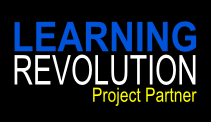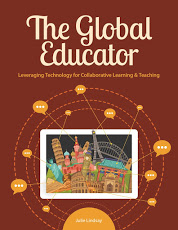Presenter: Kim Cofino
Location: Bangkok, Thailand
Twitter: @mscofino
Presentation Title: Going Global: Culture Shock, Convergence and the Future of Education
Presentation Description: Looking at daily life in foreign lands reveals a colorful spectrum of inspiring metaphors for the shifts we need to make in education. Often what we may find initially chaotic, disorienting and strange in other countries can actually spark new ways of thinking about teaching and learning. Through the voices of teachers and students from around the world, we’ll examine the unique aptitudes which allow successful expats to thrive in any environment. These are exactly the skills that future students and teachers will need to confidently enter the digital, global, converging, collaborative world of tomorrow – wherever they might be physically located.
DotSub Video Presentation Link
Blip m4v direct link (video file)
Blip mp3 direct link (audio file)
Link to presentation’s supporting documents:
http://going-global.wikispaces.com/
Additional Information:
Twitter: mscofino
Blog: http://mscofino.edublogs.org
Questions for discussion:
What global experiences have you had in real life or online that influenced your thinking about education?
Are you, or do you know any, Third Culture Kids? Do you think they share any common characteristics that make them different from people who grew up in a single culture?
How are you connecting yourself, and your students, globally? What changes have occurred (for example: in mindset, attitude or outlook) as a result of those connections?
Also join the discussion about this presentation on our conference Ning!








Pingback: Tweets that mention K12 Online Conference 2009 | 2009 PRECONFERENCE KEYNOTE:Going Global: Culture Shock, Convergence and the Future of Education -- Topsy.com
Thanks. so appreciate all ayou share and have learned a lot. In addition to good information, i really like this music. Is it thai?
I also had difficulty with the quality of the video, but I am hoping that it will be clearer later on a review for sharing.
I am inspired to return to blo9gging which I started as a reflection and then got caught up with other things. thanks for the reminder.
Thanks to Linda Cofino for an excellent view of the global ed experience. However, I’m not sure it is the role of the education system to simply (and impossibly) adapt to change and respond to ‘what students want to learn.’ An education system needs to deliver a cultural and informational foundation to students that goes beyond the ever-changing furniture and curtains; a way to put constant change into context so that it has meaning. We are not fast-food wagons that must always jump at new orders. Granted, ed systems are slow moving, but many teachers create challenging, active, global lessons within that system. Will students be disciplined enough to learn their entire curriculum from a iPhone, let alone afford one? Really?
There is an over-emphasis on the need for schools to turn on an ever-changing dime. Anyone who has tried to buy a new tv knows that your new tech is old as you swipe your debit card. Schools, such as they are, are still capable of delivering relevant material if the teacher can look beyond her own country for facts and ideas.
Finally, and I did enjoy the presentation btw (!), many of the TCKs skills and perspectives can be gained by any kind of travel, including within your own country, and or research. The lack of roots experienced by TCKs is typical of students and society in general when focus is only on change and adapting. Cofino’s ideas are sound but hopefully they will be in combination with boring old history and human experience that transcends the constant din of change.
Thanks to Kim and all the teachers and students who contributed to this presentation. Wow! It was super! Your enriched perspective of the world, cultures, languages and 21st Century traits were a real pleasure to experience. I look forward to learning more from you through the wiki, the Ning and future online experiences with fine people like you.
Regards, Dennis Richards
Kim, you were inspiring as always. Your approach from a culture shock viewpoint was excellent. I have lived in Beijing for the past six years and still, on occasion, suffer from culture shock. The comparison between living in Asia and how our schools function was very thought provoking and I will be thinking about it for quite a while.
Hearing the words of teachers and students who live in a different culture brought home your points even more strongly than just the words.
I appreciated your pictures and could definitely see Presentation Zen at work.
The final part of your presentation was practical and gave everyone a place to start or a reminder of different things we can do to enhance our PLN.
I agree with Nancy, that I have been encouraged to start blogging on a more regular basis again.
Your Keynote has set the tone for a great and informative K12 Online Conference.
Very interesting Kim thank you. I’m going to be going to bed thinking about this in conjunction with my attempts today to help our ELL students work their way through a program designed to help them learn English. Suffice it to say these students are in desperate need of more customized, just-in-time delivery of curriculum.
Thanks also for the reinforcement of the simple things that can be done to change the way that we teach. I have come a long way in the last four months and it took people who were willing to help out to bring me along. You’re right that it is the only way that things will change.
Kim,
What a great presentation. I am the middle school computer teacher at Korea International School. I love your ideas about shifting our trends in education to a global technological perspective and this encompasses a variety of ideas which you have covered very well in a concise presentation.
I wish the computer class could integrate more with other subjects but sometimes the technological requirements take up so much time that there is little time for research and writing. I have posted student work on http://www.thekismaclab.com, and I definitely want to start my PLN with other computer teachers around the world to share more of what I do in class.
Being an international teacher, traveling around the world and working with students who are also international is an exceptional life…
I look forward to watching more of your presentations
Cheers,
Roberto
Pingback: Betchablog » Blog Archive » K12 Online Conference starts today
Great presentation. Having lived and taught in Japan and The Netherlands I really appreciated how you were able to convey the difficulties, wonder, and enjoyment a person experiences when living abroad. What it did, though, was ignite the fire to experience those feelings again. I encourage teachers I meet to teach in an international school if they get the chance, but I’ve not had any takers. My daughter, now a high school senor did pre-school in a Japanese yochien and upper elementary in an international school. She has applied to attend NYU in Abu Dhabi as well as many other schools far from home because she misses the experiences. Thank you again for a wonderful Keynote.
Kim, this is was a great keynote! Even if the video rendering of the diagrams was a little hard to follow, even at full screen resolution, the ideas were clear and stimulating. Learning needs to be ‘Just in Time’ and your pictures of scooters dashing through the traffic delivering ducks was a powerful image. With so much of our institutions still delivering ‘Just in Case’ learning it’s no surprise are shopping for the cheapest Wallmart deal instead of the freshest and best. How wonderful you can always pull such a positive attitude into your delivery – thank you for firing and inspiring us with your enthusiasm!
Thanks for your inspiring presentation.
I am a Spanish educator and I taught in Texas for almost 6 years. I went through all the stages: cultural shock the first but then moved on to wonder and true appreciation of the different ways americans do, feel and act.
My world broadened and my outlook now is so much more flexible and tolerant. It was the best experience of my life. I agree that this kind of learning experience requires certain skills that are those that all students should have in a fast moving world where global will be the norm.
If American schools would ever move to “Project” based teaching we could match the speed of learning… not slowing the students down to learn at our speed. Our current setup actually teaches some concepts that are out of date. For example, our State MEA tests actually forced students to write by hand and NOT use the laptops they provided. They had to do a skill they would NOT use in the “real” world (I am not talking about writing in regards to filling out forms, but more complex)
Ah… it would be nice to be flexible…
Pingback: Blogging in the Classroom Kudos to the k21online 2009 Conference convenors * ETT* Kim Cofino Keynote
Pingback: Join the conversations Monday to Redefine Teacher Education » Moving at the Speed of Creativity
I agree Kim, but what do you think will be the impact on the physical space of the library? Are we about to throw out the books and purchase kindles? How do we thing about concrete “things” in our 21st Century lives?
I agree with your 21st Century thinking. But what should we do with our concrete library spaces? Do we throw out the books and start buying kindles?
Pingback: K12 Online Conference Begins Today | Teach Less Learn More
Kim,
Thank you for that wonderful presentation. As I watched it I couldn’t help but think that we really can bloom wherever we are planted.
The qualities you talked about are not new ones. These same qualities that will be need in the 21st century to make us successful are the same ones that were needed in the 19th century in Canada and the US to enable people to successful. I have read accounts of life during those times and it seems to me that the same skill set was needed to survive and thrive.
I really don’t even need to look back to those early pioneer days. I grew up on a small family farm in Ontario and believe me the same skill set was needed then.
I guess my point is that in the 21st century we don’t really need new skills or new attitudes, we just have to remember to develop and use the ones that we as a society have always had.
I thoroughly enjoyed the video and plan to use it with my grade 9 Learning Strategies Class for “at-risk” kids to help them see that they can be successful without a college degree. As I’m writing this, I’m thinking about ways to do this.
For reference I am K9-12 teacher and a TCK of the late 60’s and 70’s. I found that much of the presentation seemed to be a flash of the obvious. Meeting a new culture for the first time is culture shock! Returning to an old culture can also be culture shock.
The comments from the TCKs during the video were the same I heard from my parents, teachers and classmates when I attended overseas schools 40 years ago.
I will agree there is some advantage to global learning. On the other hand, we have students that do not understand their own culture, or have the basic reading and writing skills to be successful in the American Society of 40 years ago.
I am not a fan of “on demand education” in K-12 (save it for technical schools). We should not be teaching specific skills that will be outdated or obsolete in a few years. We should be teaching specifically how to: adapt to change, how to manage change and how to integrate change into an organization or group.
Also much of what is neat and innovative in Asia, like bicycles, work because of their environment. However, bicycles do not work in some environments in the USA because of the vast distances we travel and our sparse population in comparison to Asia. But, when I was teaching on a University Campus, everyone used a bicycle due to the large campus and the few and inconvenient vehicle parking lots. The environment forced us out of the cars and onto bikes.
In the United States I have visited some very interesting and diverse communities: Mexican, Indian, German, Irish, Scottish, Korean, Chinese and Italian. Often people think they must travel to “Somewhere Over the Rainbow” to encounter another culture, not true. One school district I worked with in the USA, claimed that they taught school using over 27 different languages! Now that was truly an international school district.
Pingback: Adapting to the digital culture | The Thinking Stick
Pingback: Langwitches Blog » K12 Online LAN Party Jacksonville 2010
Pingback: Langwitches Blog » Think Global School- Breaking out of the Mold
Pingback: International Schools and the Rise of Online Learning | always learning
Pingback: Thing 13 | Mrs. Hunter's Music Class
Pingback: K-12 On-Line Conference | Life Centered
Pingback: Thing 13 – Attending a Global Conference | Betty's Blog
Pingback: Culture shock can happen in different environments, but friends help minimize its effects « Moving at the Speed of Creativity
Pingback: Casey’s Video Blog Post « smarties250
Pingback: A stranger’s just a tweep you haven’t met. « onepercentyellow
Pingback: David Truss :: Pair-a-dimes for Your Thoughts » My 2010 Edublog Awards Nominations
Great presentation, and one to be shared with other colleagues. I kept thinking about what a great experience these kids have in their international schools and the great opportunity to be involved in such a variety of cultures. I feel my students really are missing out by remaining in a bubble of our own small community. We need to become global and teach difference so people better respect each other.
I enjoyed watching this video. As a world traveler, I love the culture shock I encounter every time I go to a new country. It’s such a learning experience that makes me appreciate what I have or other times makes me wish I did have in my small Pennsylvania town. While I can’t bring my students on such adventures with me, I try to bring these places back into my classroom with me whether it’s by photos I show, stories I tell, or artifacts that I collect.
Thank you for your presentation and for serving students throughout the world!
Thank you for a wonderful presentation. This really opened my eyes to how different the viewpoint is for educators around the world. It would be so fascinating to visit or teach in an International School. I think this really would positively shape the way that students view and interact with the world around them.
I enjoyed this video. It reinforced how unconnected our students really are to the world around them.
This presentation was very beneficial to me. I have gained a better understanding of different cultures and ways education varies from country to country.
I think it is always exciting to think about global learning. Having traveled abroad, I was astonished at how NON global Americans are. It is really quite disturbing, our potential for growth in cultural and religious awareness is tremendous.
This was a very eye-opening and informative video. Coming from a rural area where less privileged students may not see beyond the county limits unless it is on a school field trip, this conveys all the more information that we already noted in earlier videos that teaching globally is important.
Watching your video reminding me of so many experiences that I had from my time teaching in Africa. After being away for 20 years you have a tendency to “forget” and I am having a renewed spirit so thanks!
Thanks for a great presentation and opening up my eyes to the wonderful things happening in international schools throughout the world. It was great to hear the teachers and students speak of their experiences.
I appreciate your video and learning more about International schools. It is exciting to hear about all the opportunities and experiences available beyond my hometown.
I enjoyed watching your video and learning more about international schools. I have not had much traveling experience, but in the little that I have done, culture shock is definitely something that I have experienced.
I liked the points that you made about customization in education. As a teacher, I believe in customizing every child’s education to meet their needs. While I think of this in terms of functional and academic needs, I can see how it would relate to cultural and lifestyle needs in other settings.
Thank you for sharing about your wonderful global experiences.
I could identify with several things that were covered since I had the opportunity to teach English at a summer camp in China. I fully understand the culture shock not only when I was in China, but also when I returned to the US.
I have met several third culture kids and find them to be very global.
I wish that even a small piece of that other culture experience could happen to the students in my school. It would be so enlightening! As it is, I do try to add information about other cultures whenever possible.
I enjoyed learning about international schools. I have always wanted to teach in another country, but have alway been too comfortable to give up my life here in the United States. I still hope to someday have this opportunity, even if it just for a short time. For now, I try to travel as much as possible and see as much of the world as I can. I don’t feel like I gain a true understanding of the culture, but it is better than nothing.
I really enjoyed learning about international schools. I have always wanted to travel internationally to experience the cultures of other areas. I never thought about the possibility of teaching internationally. I think I would have the culture shock of moving permanently to another country.
I was able to identify with the culture shock that you described when I traveled from my home in the US to France. Sometimes you don’t appreciate the things you have until you no longer have them.
As a Spanish teacher, I had the opportunity to study abroad in Spanish and Puerto Rico. This provided me with valuable life experiences. I share this knowledge with my students. It really brings the language alive for them!!
The only global experiences I’ve had is anything I watch on the news, read in newspapers/books or have seen in documentaries/movies (true or not). Many thoughts I’ve had is that other countries place such a high regard on education. Education is first. That’s not always so in America.
I try to connect my classroom globally by discussing with my students current events happening around the world (the meteorite crash in Russia was a big hit a few years ago). I also like to bring to my students’ attention that we as a country are better off than other countries in how we live our daily lives (freedom).
The video hit home with so many great points. We need to develop collaboration and responsibility, rather than working in isolation. The mentality of teaching to the whole group rather than the individual child still prevails in so many schools today. Unfortunately I think that the imbalance between resources plays a major factor in this. How do you expose students to personalized learning paths without critical resources, such as technology?
When I graduated college in 1990, I moved to Florida immediately to start my career. I had never been to Florida, had no family or friends there. To be honest, I had never even been to a beach prior to my move there. This was pre-internet, so my access to information was very limited both prior to the move and as I became acclimated to my new home. So I had an awful lot to learn about life in general at the same time that I was learning to be a teacher and a coach. Those 6 years in Tampa truly shaped who I am as an educator in so many ways. I spent a lot of time soaking up as much knowledge about how to work with children/families from so many veteran teachers and coaches. I learned a lot about keeping away from preconceived notions about people and their surroundings. It shaped me to learn how to meet students where they are, to differentiate according to needs. I learned a lot about how to be explicit in my expectations and how to leverage clear expectations in ways to hold students accountable to learning. Nowadays, 26 years later, I still feel as though I utilize a lot of what I learned way back then to ensure that I am connecting my students globally. I am constantly looking for ways to connect our students to new and interesting experiences that can further their understanding of where they fit into the world. I want them to know as much as possible about the possibilities that exist if they can just maintain the skills necessary to navigate the decorum it sometimes takes to gain entry into them.
While I was in my education program, one fellow student introduced me to teaching in an international school. She was teaching in Beligium at an international school. I worked as an on-location educator, (a teacher for children working on a television show and not attending a regular school). My close friends are a third culture family. I have learned how much easier it is for them to manivure the world, language, culture, travel,experiences, understanding of world systems, opportunities. The video mentions flexibility and ease to work and adapt to different cultures. this is the main connection that I have identified.